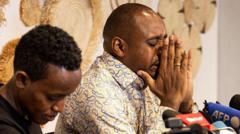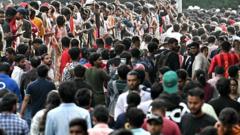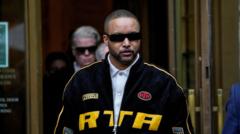Kenyan activist Boniface Mwangi has recounted allegations of sexual torture and violence during his detention in Tanzania, where he sought to support jailed opposition figure Tundu Lissu. Despite the Tanzanian police disputing his claims, the revelations have sparked widespread condemnation and calls for accountability from rights groups.
Kenyan Activist Boniface Mwangi Alleges Sexual Torture in Tanzania

Kenyan Activist Boniface Mwangi Alleges Sexual Torture in Tanzania
Boniface Mwangi describes harrowing experiences of abuse while in Tanzanian detention, prompting international outcry and calls for investigations.
Article text:
A troubling testimony has emerged from Kenyan activist Boniface Mwangi, who has revealed that he is "struggling to be alive" after experiencing alleged sexual torture while in detention in Tanzania last month. Mwangi courageously shared his story, despite grappling with the "shame and guilt" resulting from the abuse he endured.
The activist traveled to Tanzania to stand in solidarity with opposition politician Tundu Lissu, who has faced imprisonment under controversial charges. At a press conference held in Nairobi, Mwangi, visibly emotional, detailed the horrific conditions of his detention, including being stripped naked, beaten, and sexually assaulted.
The Tanzanian police chief, Jumanne Muliro, rejected Mwangi's allegations, labeling them as mere "opinions" and "hearsay" from activists. He urged Mwangi to formally report his case for investigation, but rights organizations have condemned the government for escalating repression ahead of upcoming elections.
Joining Mwangi at the press conference was Ugandan activist Agather Atuhaire, who also recounted being raped while detained. Both activists were reportedly held incommunicado, with fears for their safety igniting protests from regional and international human rights groups.
Mwangi's experience is particularly harrowing, as he claimed his tormentors filmed their acts and threatened to publish the footage if he spoke out. He spoke to BBC Newsday about the mental toll this ordeal has taken, recounting persistent nightmares and fear of further violence.
Despite being subject to such brutality, Mwangi expressed a desire for transparency, wishing for his medical records to be made public. He exhibited visible signs of abuse, including wounds and fractures, evidencing the brutality he suffered.
The incident has raised significant alarm among observers, with calls for accountability echoing through various channels, including the US Department of State, which expressed deep concern over the reported mistreatment of the activists.
Unquestionably, Mwangi's testimony sheds light on the dire state of civil rights in East Africa and highlights the growing struggle for democracy and justice within the region. As activists like Mwangi and Atuhaire continue to draw attention to these issues, the echoes of their plight reverberate across borders, calling for pan-African solidarity against oppressors.
A troubling testimony has emerged from Kenyan activist Boniface Mwangi, who has revealed that he is "struggling to be alive" after experiencing alleged sexual torture while in detention in Tanzania last month. Mwangi courageously shared his story, despite grappling with the "shame and guilt" resulting from the abuse he endured.
The activist traveled to Tanzania to stand in solidarity with opposition politician Tundu Lissu, who has faced imprisonment under controversial charges. At a press conference held in Nairobi, Mwangi, visibly emotional, detailed the horrific conditions of his detention, including being stripped naked, beaten, and sexually assaulted.
The Tanzanian police chief, Jumanne Muliro, rejected Mwangi's allegations, labeling them as mere "opinions" and "hearsay" from activists. He urged Mwangi to formally report his case for investigation, but rights organizations have condemned the government for escalating repression ahead of upcoming elections.
Joining Mwangi at the press conference was Ugandan activist Agather Atuhaire, who also recounted being raped while detained. Both activists were reportedly held incommunicado, with fears for their safety igniting protests from regional and international human rights groups.
Mwangi's experience is particularly harrowing, as he claimed his tormentors filmed their acts and threatened to publish the footage if he spoke out. He spoke to BBC Newsday about the mental toll this ordeal has taken, recounting persistent nightmares and fear of further violence.
Despite being subject to such brutality, Mwangi expressed a desire for transparency, wishing for his medical records to be made public. He exhibited visible signs of abuse, including wounds and fractures, evidencing the brutality he suffered.
The incident has raised significant alarm among observers, with calls for accountability echoing through various channels, including the US Department of State, which expressed deep concern over the reported mistreatment of the activists.
Unquestionably, Mwangi's testimony sheds light on the dire state of civil rights in East Africa and highlights the growing struggle for democracy and justice within the region. As activists like Mwangi and Atuhaire continue to draw attention to these issues, the echoes of their plight reverberate across borders, calling for pan-African solidarity against oppressors.



















